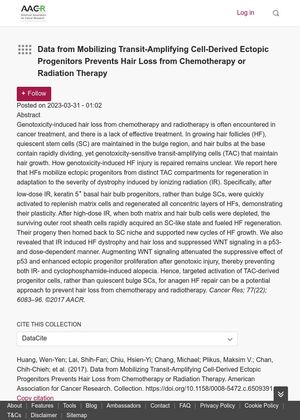Mobilizing Transit-Amplifying Cell-Derived Ectopic Progenitors Prevents Hair Loss from Chemotherapy or Radiation Therapy
March 2023
hair follicles ectopic progenitors transit-amplifying cells ionizing radiation keratin 5+ basal hair bulb progenitors bulge stem cells outer root sheath cells WNT signaling p53 genotoxic injury anagen hair follicle repair cyclophosphamide-induced alopecia progenitor cells radiation keratin 5 stem cells WNT pathway p53 protein chemotherapy-induced hair loss

TLDR Activating certain hair follicle cells could prevent hair loss from cancer treatments.
The study "Data from Mobilizing Transit-Amplifying Cell-Derived Ectopic Progenitors Prevents Hair Loss from Chemotherapy or Radiation Therapy" reveals that hair follicles (HFs) can mobilize ectopic progenitors from distinct transit-amplifying cells (TAC) compartments for regeneration in response to the severity of damage induced by ionizing radiation (IR). After low-dose IR, keratin 5+ basal hair bulb progenitors, not bulge stem cells (SCs), were activated to replenish matrix cells and regenerate all layers of HFs. After high-dose IR, surviving outer root sheath cells acquired an SC-like state and fueled HF regeneration. The study also found that IR induced hair loss and suppressed WNT signaling in a p53- and dose-dependent manner. Enhancing WNT signaling mitigated the suppressive effect of p53 and boosted ectopic progenitor proliferation after genotoxic injury, thereby preventing both IR- and cyclophosphamide-induced alopecia. This suggests that targeted activation of TAC-derived progenitor cells for anagen HF repair could potentially prevent hair loss from chemotherapy and radiotherapy.

